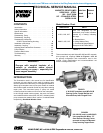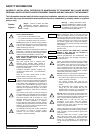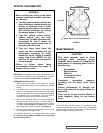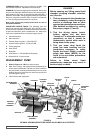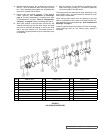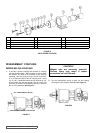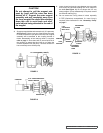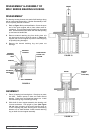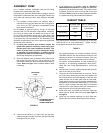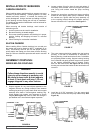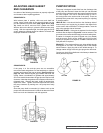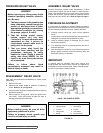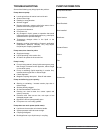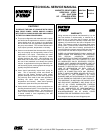
SECTION TSM 845 ISSUE F PAGE 13 OF 14
Some of the following may help pinpoint the problem:
Pump does not pump:
► Lost its prime from air lead or low level in tank.
► Suction lift too high.
► Rotating in wrong direction.
► Strainer clogged.
► Bypass valve open, pressure relief valve set too low or
pressure relief valve poppet stuck open.
► Improper end clearance.
► Pump worn out.
► Any changes in liquid, system or operation that would
influence pump or coupling performance, e.g. new liquid,
additional lines or process changes.
► Temperature changes either in the liquid or the
environment.
► Magnetic coupling is decoupling. Change in application
(temperature, pressure, viscosity,’ etc.) may require
torque beyond coupling capabilities.
Pump starts, then loses its prime:
► Supply tank empty.
► Liquid vaporizing in the suction line.
► Air leak or air pocket in the suction line.
Pump is noisy:
► Pump is being starved (heavy liquid cannot get to pump
fast enough). Increase suction pipe size, reduce length
or slow down pump.
► Pump is cavitating (liquid vaporizing in suction line).
Increase suction pipe size or reduce length.
► Check alignment.
► Magnetic coupling decoupled. Shut off and restart.
Pump not delivering up to capacity:
► Starving or cavitating - increase suction pipe size or
reduce length.
► Strainer partially clogged.
► Air leak somewhere in suction line.
► Running too slow. Is motor the correct speed and
wired up correctly.
► Pressure relief valve set too low, tuck open or has
damaged poppet / seat.
► Bypass line around pump partially open.
► Pump worn out or too many gaskets.
Pump takes too much power (stalls motor):
► Liquid more viscous than unit sized to handle.
► System pressure relief valve set too high.
► Coupling misaligned.
► Bushings frozen up or liquid set up in coupling.
TROUBLESHOOTING PUMP INFORMATION
Pump Model Number:
Serial Number:
Date Received:
Date Installed:
Distributor:
Contact Person:
Phone:
Fax:
E-mail:
Comments:



